Podcast
Questions and Answers
What is the primary function of the talking drum in African culture?
What is the primary function of the talking drum in African culture?
- To provide background music for storytelling
- To create melodic tunes for dancing
- To accompany choirs in religious ceremonies
- To send messages and announce events (correct)
Which of the following instruments is primarily played by plucking rather than striking?
Which of the following instruments is primarily played by plucking rather than striking?
- Zither (correct)
- Musical Bow
- Rasp
- Shekere
Which of these instruments is known as Africa's most sophisticated harp?
Which of these instruments is known as Africa's most sophisticated harp?
- Kora (correct)
- Lute
- Trumpet
- Mbira
What sound does the rasp produce?
What sound does the rasp produce?
How is the mbira primarily played?
How is the mbira primarily played?
What is the primary purpose of traditional African music?
What is the primary purpose of traditional African music?
Which musical genre is a fusion of West African and Black American music?
Which musical genre is a fusion of West African and Black American music?
What is Kwassa Kwassa known for?
What is Kwassa Kwassa known for?
Which of the following genres is characterized by a fast, carnival-like rhythm from Creole slang for 'party'?
Which of the following genres is characterized by a fast, carnival-like rhythm from Creole slang for 'party'?
Which of the following artists is NOT known for performing the blues genre?
Which of the following artists is NOT known for performing the blues genre?
Apala or Akpala music is primarily used for what purpose during Ramadan?
Apala or Akpala music is primarily used for what purpose during Ramadan?
What is a key characteristic of soul music?
What is a key characteristic of soul music?
Which genre evolved into African Jazz during the 1930s to 1960s?
Which genre evolved into African Jazz during the 1930s to 1960s?
What does the term 'Salsa' encompass in the context of music?
What does the term 'Salsa' encompass in the context of music?
Which of the following best describes the method of call and response in music?
Which of the following best describes the method of call and response in music?
Which instrument is known as a West African xylophone?
Which instrument is known as a West African xylophone?
Which music genre is known for its strong connections to African-American communities and originates from the late 19th century?
Which music genre is known for its strong connections to African-American communities and originates from the late 19th century?
What is the primary material used to cover a djembe?
What is the primary material used to cover a djembe?
Which of the following songs is considered an example of spiritual music?
Which of the following songs is considered an example of spiritual music?
What is a unique feature of the agogo instrument?
What is a unique feature of the agogo instrument?
The slit drum is categorized as what type of instrument?
The slit drum is categorized as what type of instrument?
Flashcards
Afrobeat
Afrobeat
A fusion of West African and Black American music styles.
Apala
Apala
Yoruba music from Nigeria, played after fasting during Ramadan.
Juju
Juju
Nigerian music style using traditional Yoruba rhythms.
Kwassa Kwassa
Kwassa Kwassa
Signup and view all the flashcards
Salsa
Salsa
Signup and view all the flashcards
Samba
Samba
Signup and view all the flashcards
Reggae
Reggae
Signup and view all the flashcards
Maracatu
Maracatu
Signup and view all the flashcards
Shekere
Shekere
Signup and view all the flashcards
Talking Drum (Luna)
Talking Drum (Luna)
Signup and view all the flashcards
Mbira
Mbira
Signup and view all the flashcards
Musical Bow
Musical Bow
Signup and view all the flashcards
Blues Feelings
Blues Feelings
Signup and view all the flashcards
Soul Music
Soul Music
Signup and view all the flashcards
Spiritual Music
Spiritual Music
Signup and view all the flashcards
Call and Response
Call and Response
Signup and view all the flashcards
Balafon
Balafon
Signup and view all the flashcards
Rattles
Rattles
Signup and view all the flashcards
Agogo
Agogo
Signup and view all the flashcards
Slit Drums
Slit Drums
Signup and view all the flashcards
Study Notes
Introduction to African Music
- African music is a significant part of daily life, deeply entwined with religious and political expression.
- Traditional African music serves various functions, a major role in ceremonies like births, deaths, marriages, and other significant events. It also plays a role in worship and spirit invocations.
Types of African Music
- Afrobeat: A fusion of West African and Black American music styles.
- Apala or Akpala: A Nigerian Yoruba musical genre played to wake worshippers after the Ramadan fast.
- Axe: A popular musical genre from Salvador, Bahia, and Brazil which combines Afro-Caribbean Marcha, Reggae, and Calypso styles.
- Jiti: A fast-paced, percussive Zimbabwean dance music, influenced by mbira-based guitar styles.
- Jive: A popular South African genre characterized by a lively, uninhibited variation of the jitterbug (swing dance).
- Juju: A popular Nigerian music style primarily using traditional Yoruba rhythms.
- Kwassa Kwassa: A dance style originating in Zaire (now the Democratic Republic of Congo) in the late 1980s, popularized by Kanda Bongo Man.
- Marabi: A South African three-chord township music style from the 1930s-1960s that evolved into African jazz.
- Reggae: A Jamaican music sound dominated by bass guitar and drums.
- Salsa: A Cuban, Puerto Rican, and Colombian dance music incorporating various styles (son montuno, guaracha, cha-cha-cha, mambo, and bolero).
- Samba: The foundation rhythm for most Brazilian music.
- Soca: Trinidadian and Tobagonian pop music combining soul and calypso styles.
- Were: Muslim music used as a wake-up call for early breakfast and prayers during Ramadan celebrations.
- Zouk: A fast, carnival-like rhythmic music from Creole slang, meaning party.
Vocal Forms of African Music
- Maracatu: An African Brazilian genre combining strong rhythms of African percussion instruments with Portuguese melodies.
African American Music
- Blues: A late 19th-century musical form with deep roots in African-American communities, conveying feelings of misfortune, love loss, frustration, or loneliness. Notable musicians include Ray Charles, James Brown, Aretha Franklin, and John Lee Hooker.
- Soul Music: A popular 1950s and 1960s music genre originating in the United States, combining elements of African-American gospel music, rhythm and blues, and jazz. Key figures include James Brown. Examples include "Ain't no Mountain High Enough," "All I Could Do Is Cry," "Soul to Soul," and "Ben."
- Spirituals: Songs primarily religious in nature, created by enslaved African Americans in the US. Examples include "We Are Climbing Jacob's Ladder," "Rock My Soul," "When the Saints Go Marching In," and "Peace Be Still."
Musical Instruments
- Balafon: A West African xylophone with bars made from wood or bamboo.
- Rattles: Instruments made of various materials like seashells, tin, basketry, animal hoofs, and coconuts.
- Agogo: A single or multiple bell instrument of Yoruba origin used in traditional Yoruba music and samba bateria ensembles.
- Atintintkon: Percussion instruments - slits gongs carved from wood to resemble ancestors - used for communication between villages.
- Slit Drums: Hollow percussion instruments, not true drums but idiophones.
- Djembe: A West African hand drum.
- Shekere: A West African gourd instrument with beads covering cowrie shells.
- Rasp/Scraper: Hand percussion instrument using notches on pieces of wood scraped with a stick.
- Talking Drum (Luna): Used to send messages around villages for important events, including births, deaths, or wars, and believed to communicate with the spirits.
- Mbira: A thumb piano or finger xylophone of African origin, where thumbs pluck the metal tines.
- Musical Bow: The ancestor of string instruments, played by plucking or striking its string with a stick, creating a delicate sound.
- Lute (Nkoni): A stringed instrument shaped like a modern guitar and played in a similar fashion.
- Kora: Africa's most sophisticated harp, with similarities to a lute.
- Zither: Stringed instrument with varying shapes and sizes, where strings run along its body.
- Zeze: A bowed African fiddle instrument.
- Anteben: A bamboo flute of Ghana.
- Fulani Flutes: Characteristic flutes of the Fulani people.
- Panpipes: A musical instrument with several pipes of varying lengths, played in a horizontal position.
- Kudu Horn: Instrument made from the horn of a kudu antelope.
- Reed Pipes (rhaita or ghaita): Most well-known reed pipe.
- Whistle: Wind instruments.
- Trumpets: Tubular wind instruments.
Styles of Music and Performance
- Call and Response: A performance style where musical phrases are exchanged between different musicians, with the second phrase acting as a response or commentary on the first. Important pieces playing in this style include "Mannish Boy" by Muddy Waters and "School Day" by Chuck Berry.
Studying That Suits You
Use AI to generate personalized quizzes and flashcards to suit your learning preferences.




